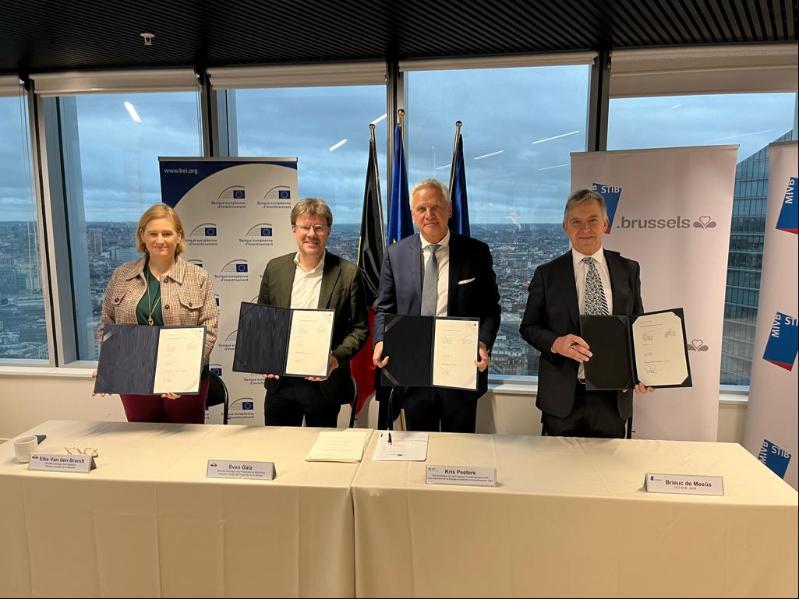
- The European Investment Bank will provide €475 million to the Brussels-Capital Region to upgrade the existing north-south pre-metro connection to a fully-fledged metro line.
- The loan will support this transformation, covering a 5km stretch between the stops “Albert” and “Gare du Nord / Noordstation”.
- By improving availability, reliability and service, the project is part of Brussels’ plans to cut individual trips in motor vehicles by offering valid alternatives.
The financing for Brussels’ planned north-south metro line is taking concrete shape. The European Investment Bank (EIB) and the Brussels Capital Region have agreed a €475 million loan agreement to upgrade the existing underground tram connection between the Albert and Gare du Nord / Noordstation stops to a fully underground metro (the City’s new metro line 3).
Brussels has long suffered economic losses due to traffic jams and the medical consequences of air pollution. Now, the regional government is attempting to tackle these problems by implementing the Good Move mobility plan, a cornerstone of which is increasing the public transportation offer. Once operational, the new M3 line will make public transport services more reliable, regular, frequent and accommodating. The ultimate aim is to make public transport more attractive than driving.
“Accomplishing metro 3 is and will remain a priority for the Brussels-Capital Region. It will significantly reduce travel time for residents, commuters, and visitors of our capital. I am therefore very pleased with the agreement that we have been able to achieve together with the EIB. These funds show the importance and confidence that both partners have in this public transportation project,” explained Rudi Vervoort, Minister-President of the Brussels-Capital Region.
EIB Vice-President Kris Peeters added, “Sustainable transport is a key area of support for the European Investment Bank, also in Brussels. Last year we already agreed to provide the necessary funding to the Capital Region for new metro carriages and refurbishment of the tracks. With this new project, we are happy to support the region again in the further development of their mobility plan. Brussels is seeing a real growing demand for soft mobility, and as the Climate Bank of Europe, we are of course happy to support that.”
Regional Minister for Mobility Elke van den Brandt remarked, "In Brussels, we see mobility as a powerful lever to improve the city and the life quality of its residents. That's why we invest one sixth of our total annual budget in public transportation, cycling and walking infrastructure and road safety to offer more alternatives to the car and to offer more quiet and green public spaces. I am thrilled that the European Investment Bank believes and invests in our metro project to make Brussels a more fluid, liveable, people-centred city."
Brussels minister for Finance and Budget Sven Gatz: "The EIB's financing of 475 million euros confirms that the metro 3 project, the largest public transport investment since the Brussels-Capital Region came into existence, is on track. This is the second time during this legislature that the EIB and the Brussels-Capital Region have signed an agreement, and I'm proud of it."
Brieuc de Meeûs, CEO of STIB-MIVB: “The metro is an essential means of transport in the capital of Europe. That is why I am particularly pleased that the EIB is providing a loan to the Brussels Capital Region to build that necessary missing link in the metro network from the northern to the southern part of the region. These investments are absolutely indispensable to the economy of Brussels, to the many people who live here and to the future of mobility in a densely populated part of the city.”
The project covers the new construction of an underground tunnel between the “Gare du Midi / Zuidstation” and “Anneessens” stops, the creation of a new stop named in honour of Toots Thielemans (currently called “Constitution”), as well as the optimisation of the underground tram lines between the “Bodeghem” and “Avenue du Roi / Koningslaan” stops.
Background information:
The European Investment Bank (EIB) is the EU institution for long-term loans. Its shares are held by the 27 EU Member States, with 5.2% owned by Belgium. The EIB makes long-term financing available for sound investments that contribute towards the EU's policy objectives. In 2022 the EIB provided nearly €2.3 billion in financing for Belgian projects.
The Brussels-Capital Region is one of the three regions of Belgium, alongside the Walloon Region and the Flemish Region. It comprises 19 municipalities including the City of Brussels, the most densely populated part of Belgium. It covers 162 km2 and has over 1.2 million inhabitants.
The Brussels Intercommunal Transport Company (STIB-MIVB) is Belgium's largest urban public transport company. It serves the 19 municipalities of the Brussels Capital Region and 11 peripheral municipalities. Its area of operation covers 241.5 km². The STIB network has 4 metro lines, 18 tram lines, 55 bus lines and 11 night bus lines.



